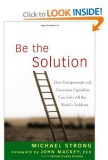Be the Solution: How Entrepreneurs and Conscious Capitalists Can Solve All the World’s Problems

|
Title | Be the Solution: How Entrepreneurs and Conscious Capitalists Can Solve All the World’s Problems |
| Author | Michael Strong, John Mackey | |
| Reviewer | Frederick Turner | |
| Review Date | July 15, 2009 | |
| Publisher | Hoboken, New Jersey: John Wiley & Sons, Inc. | |
| Year | 2009 | |
| Rate this Book |
Back in Shakespeare’s day a remarkable group of people came together, more or less in secret, calling themselves “The School of Night.” They ended up being responsible for starting a large percentage of the ideas and projects that made England great in the next four centuries. One of their number was the great mathematician/scientist Thomas Hariot, who created several of our algebraic signs, the fundamentals of modern atomic theory, some elements of calculus, the telescope (before Galileo), the first dictionary of the Algonquin language, and (with Ferdinand Vieta) the modern usage of the zero.
The School of Night included also the explorer/courtier/historian Walter Raleigh, the painter Nicholas Hilliard, the warrior/poet/diplomat Philip Sidney, the voyager Richard Hakluyt, the astronomer Giordano Bruno, Montaigne’s translator John Florio, the dramatist Christopher Marlowe, and the poets Edmund Spenser and George Chapman, the translator of Homer. The School of Night loved darkness, mysteries, secrecy, and forbidden knowledge, and some were condemned to death for their views.
Such a group seems to exist today, calling itself FLOW, but we might consider them as “The School of Day,” for they light explanations, transparency, and open knowledge; and though in certain regimes they would be (and some have been) targets for execution or assassination, they have so far dodged the bullets. Where they resemble the School of Night is in the flood of ideas they generate—in their case, ideas earnestly and often plausibly designed, as the book’s subtitle declares, to solve all the world’s problems.
They include John Mackey, the visionary CEO of Whole Foods Market; Muhammad Yunus, the Nobel Prizewinning founder of the Grameen microfinance bank; Candace Smith, the national award-winning educator in the Socratic method; Kartar Singh Khalsa, CEO of Golden Temple foods; Donna Callejon, COO of Global Giving; Hernando de Soto, the revolutionary third-world legal economist; Brian Johnson, CEO of Zaadz; Don Beck, the renowned psychologist; Jeff Klein, the author of Working for Good: Making a Difference, While Making a Living; and Strong himself, an educational activist with an extraordinary record for creating academically excellent schools in unpromising locations.
Most of the best ideas for real progress in the world today have come neither from the right nor the left but from a radical center that is pragmatic, idealistic, playful, unashamed of its devotion to uplift, happily prepared to use the instruments of filthy lucre to improve the world, and incomprehensible to haters, ideologues, conspiracy theorists, and authoritarians. This book is among other things a singularly useful compendium of many of those ideas from a wide range of fields, practices, disciplines, and parts of the world. Some of them are relatively new ideas, like prediction markets as a powerful discovery tool, the market-capture of environmental and social externalities, free enterprise zones, profitable stakeholder-based business management, lifestyle industries, for-profit philanthropic enterprises, education and medical vouchers, microfinance and facilitated legal property rights for the poor. Some are old ideas given radical new dimensions, like moral education, the virtues of freedom and free competition, the Invisible Hand, the Maslovian pyramid of human needs and aspirations, holistic health care, and evolutionary psychology.
But it is in the combination of all these ideas that the truly visionary quality of this book subsists. What would be a major flaw in its literary coherence—the very disparate voices and styles of its many contributors, ranging from academic economics through New Age mysticism, thoughtful cultural criticism, hard-hitting advocacy rhetoric, and self-help breezy muscular uplift, to Huxleyan science-fiction extrapolation—is actually an advantage in this case. The book illustrates in its very format the coming-together of radically different worldviews for the shared pragmatic purpose of making the world a better place. It’s a big tent, including conservative, libertarian, and liberal perspectives, first- and third-world viewpoints (the socialist “second-world” having virtually disappeared), Enlightenment and Romantic modes of thought, techno-wonk enthusiasm and ancient wisdom.
And there are certain deeper themes that seem to run through all the varied and various pieces in the book. One of them is an implicit recognition of the profound contradictions in our existing set of established ideological positions. For instance, it looks very much as if conservatives and liberals both contradict themselves with respect to open (free) systems. Many conservatives who enthusiastically embrace the free market’s self-organizing and evolutionary price discovery system, in which new technology, new desires, and new economics emerge as a result of competition and nonzero-sum collaboration, also reject the theory of evolution and its identical principles of competitive discovery, symbiosis, self-organization, autocatalysis and autopoesis. Likewise, liberals who ridicule fundamentalist conservatives for their belief that the divine economy of the universe is a dirigiste command economy, always being tweaked by a superior and transcendent Administrator (Who deceitfully works in secret), seem quite unaware that their own “intelligent design” notions of how government can run an economy appear to conservatives quite as naïve as the Scopes Trial prosecutors’ views on human ancestry.
It almost seems as if being smart about biological self-organization tends to make people stupid about economic and social self-organization, and vice-versa. The people who wrote this book are smart about both; and I believe there is a profound theological reason for the difference. Both religious fundamentalists and “progressive” neo-socialists are, I believe, terrified of a God who really wants us, and the universe itself, to be free. The former makes Him control physical reality so as to compensate for the horrors of human moral freedom, the latter, rejecting human moral freedom as a superstition, seeks to replace a dead divine controller with a live governmental one. FLOW people really do believe in freedom, a belief much rarer than is commonly thought.
I do not mean to imply that the authors of this book are unaware of the problems of market idolatry. What is especially refreshing about their perspective is that it recognizes the need for the rule of law as a precondition for effective markets and as a way to charge social and environmental costs to their proper owners. Even more refreshing is their recognition that economic health, and the economic mechanisms that create it, are only a part of a larger economy that includes a wealth of free gifts and a hierarchy of higher-than-economic values. Good economics is an absolutely necessary but absolutely insufficient condition for the truly good life.
Self-organization—the capacity for nonlinear feedback systems to freely generate new ordered realities that subsume their pasts and revalue the rest of the universe—is not the sole prerogative of any level of reality. It is not the prerogative only of the fundamental forces of physics, or of the world of elementary particles or that of the Mendeleev Table of the chemical elements; nor is it only of the DNA molecule, or of the Selfish Gene, or of individual living organisms competing to survive and reproduce, nor of kin groups or social groups or parliaments or academic forums of science or legal traditions or democracies or markets. Maybe we first saw the Invisible Hand in markets (and I believe Darwin owes more to Adam Smith than is recognized), but there are Invisible Hands everywhere, and their actions can, by a combination of art and science and spiritual insight, be apprehended and partly understood if not predicted. If the Invisible Hand is both the unique work of freedom and the creator of more sensitive and inclusive forms of order, perhaps it implies a new sort of theology, as suggested by Robert Wright in his awkward but useful term “nonzerosumness” (in his book Nonzero) and as implied by many of the writers in Be the Solution.
Our present economic crisis in some ways stands revealed in the light of their book as a consequence of our leaders having ignored the new ideas for a new time. We are no longer living in a modernist age, and we are beginning to claw our way out of the debilitating miasma of postmodernism. Perhaps the economic crash is the punctuation mark—the true punctuation mark, as opposed to 9/11—that marks the end of one age and the beginning of another.
Frederick Turner is the Founders Professor of Arts and Humanities at the University of Texas at Dallas and a contributing editor to Conversations on Philanthropy.



